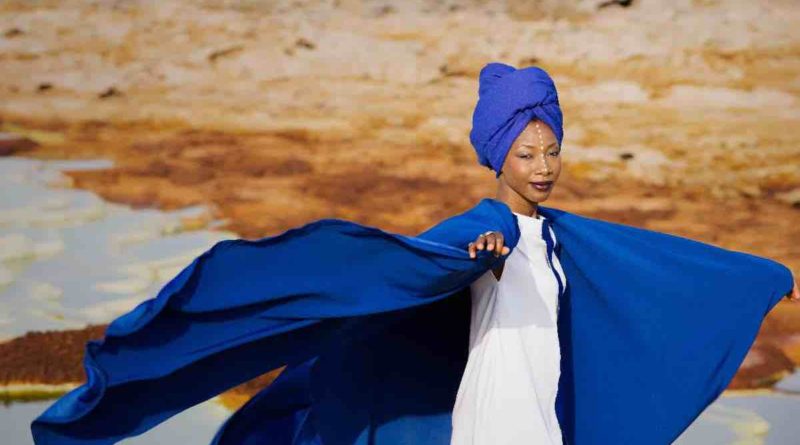INTERVIEW: Fatoumata Diawara set for NYC concert at Town Hall
Photo: Malian singer Fatoumata Diawara will play the Town Hall in New York City. Photo courtesy of Aida Muluneh / Provided by Cindy Byram PR with permission.
Singer Fatoumata Diawara, a massively respected interpreter of modern African music, is set to bring her bonafide skills to the Town Hall in New York City Friday, Feb. 21. Gaby Moreno will open the show.
The singer, whose roots go back to Mali, is touring in celebration of her second album, Fenfo (translated as “something to say”), which was recently nominated for a Grammy Award. On the record, she touches up on a variety of important issues, including respect, humility, migration and, of course, love, according to press notes.
Never one to rest on her laurels, Diawara has expanded her career to many different means of artistic expression. In addition to her singing projects, she has also dabbled in acting and activism, and her musical collaborations are legendary, including the likes of jazz maestro Herbie Hancock; singer-songwriter Bobby Womack; West African musicians Amadou and Mariam, Oumou Sangaré and Toumani Diabaté; and even Paul McCartney, according to her official biography. Add in Cuban legend Omara Portuondo and jazz vocalist Dee Dee Bridgewater for good measure.
Today, Diawara no longer lives in her native Mali. Instead, she has been enjoying her personal and professional life in France and now Italy, although Mali is always in her heart and mind. Case in point: She continues to sing mostly in Bambara, the national language of Mali.
Recently Hollywood Soapbox exchanged emails with Diawara about her life and career. Questions and answers have been slightly edited for style.
What inspired you to record the album Fenfo?
I am inspired by many different things because nowadays there are so many subjects to talk about, especially when I think about my Africa. There are many issues that are important: our children, conditions for women, our society. I go there and also into my own life experiences, my background. The album Fenfo includes all of this. I talk about this world, normal life, love, peace, emigration.
Will you be playing some of these new songs at the Town Hall show?
Yes, of course, I will be playing my new album Fenfo. I will include two or three songs from my first album (2012’s Fatou), but for now I am happy to share the Fenfo experience.
How do you know when to follow a musical tradition and when to head in a completely new, innovative direction?
To me it’s very easy; music is changing, so I adapt myself to the new trends without forgetting my roots and with huge respect for my traditional music. I try to be in the middle of both worlds, but keeping the balance is sometimes not easy in music — or in general for everything! In Mali, our tradition is very strong, and it needs to be protected and supported. I want to keep in the middle of past and present.
What was it like to grow up in Bamako, Mali?
Very special in many ways. I am not sure if it was the best part of my life, but it is the part that makes me be who I am today. It was hard being a teenager as I knew I could achieve more than what older people were proposing to me. Even at school I was bored. I liked to experiment with things, and I thought that the planet was huge. So being at Bamako was not easy — I wanted to travel and learn from the world. But at the same time, it was beautiful for me to be close to my roots, and today I know who I am. As a result, it’s difficult for me to get lost because I know my culture well. I know the traditions and where I come from. My country will always be part of me.
How influential was the music scene in the capital city?
Amazing! I learned a lot from many different types of music going on there and many kinds of instruments, so it was all very positive.
Was it difficult to leave the country and head to Europe?
Yes, it was very hard, but this experience made me very strong because I realized that my life was in my hands. If I did not stand up and move I could be vulnerable. To make this trip without my parents’ support was very difficult because nobody in my family had done it before. But I am happy about taking that leap because today I am an example to my family’s younger generation, and they respect me. I really feel I am a survivor.
Do you feel your songs are hopeful for the future? Are you personally hopeful for the future?
I am hopeful for the future. Sometimes, when I am surrounded by people who are depressed about the world situation, I have doubts — but not when I am alone. To me everything is possible. If we fight together, it’s going to work. I hope that with the help of all artists (not only me), as well as from all the peace-loving people on the planet, we can get it right. We have to do it together, but, of course, you need to believe in it first. And I do!
By John Soltes / Publisher / John@HollywoodSoapbox.com
Fatoumata Diawara will perform Friday, Feb. 21 at the Town Hall in New York City. Click here for more information and tickets.

